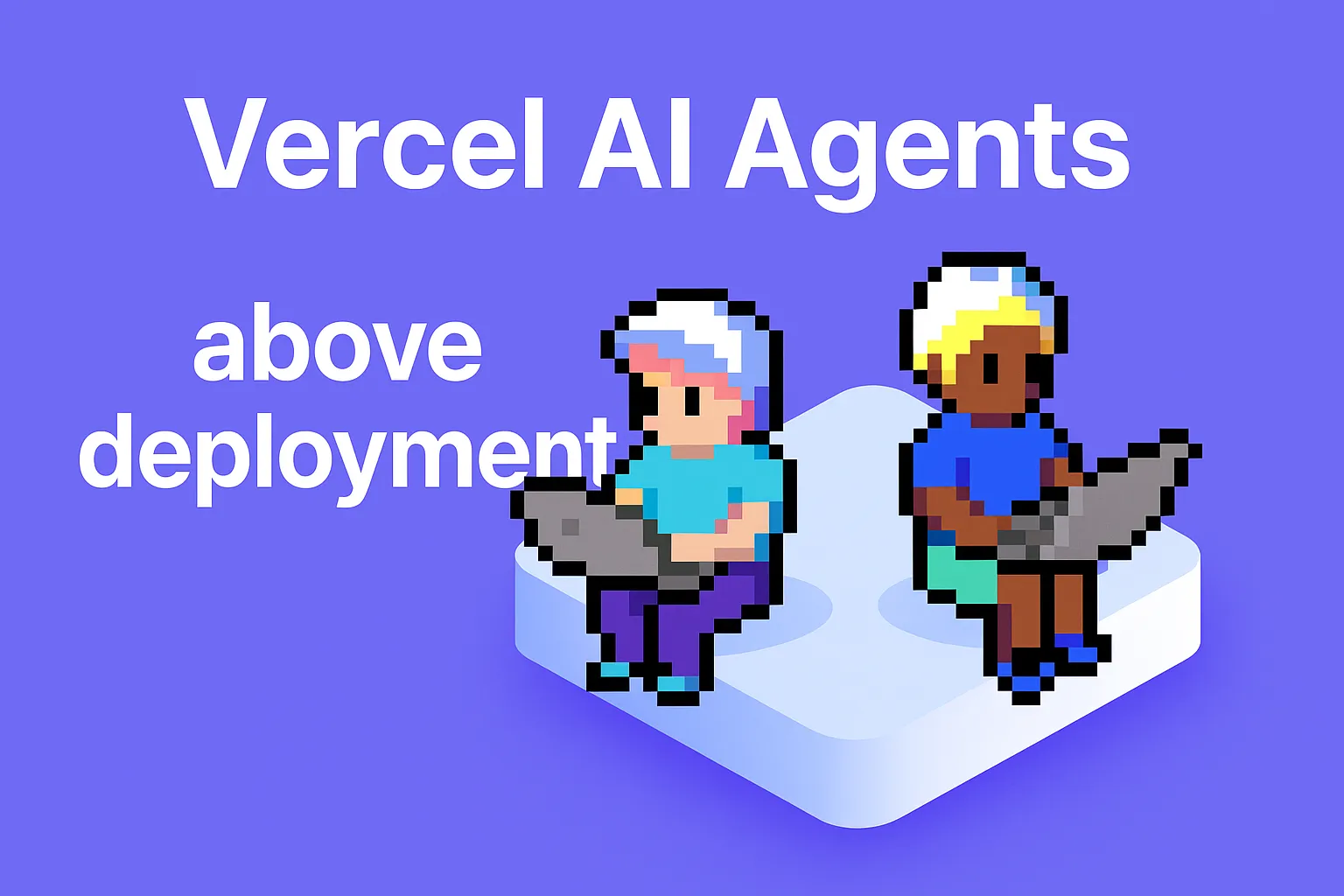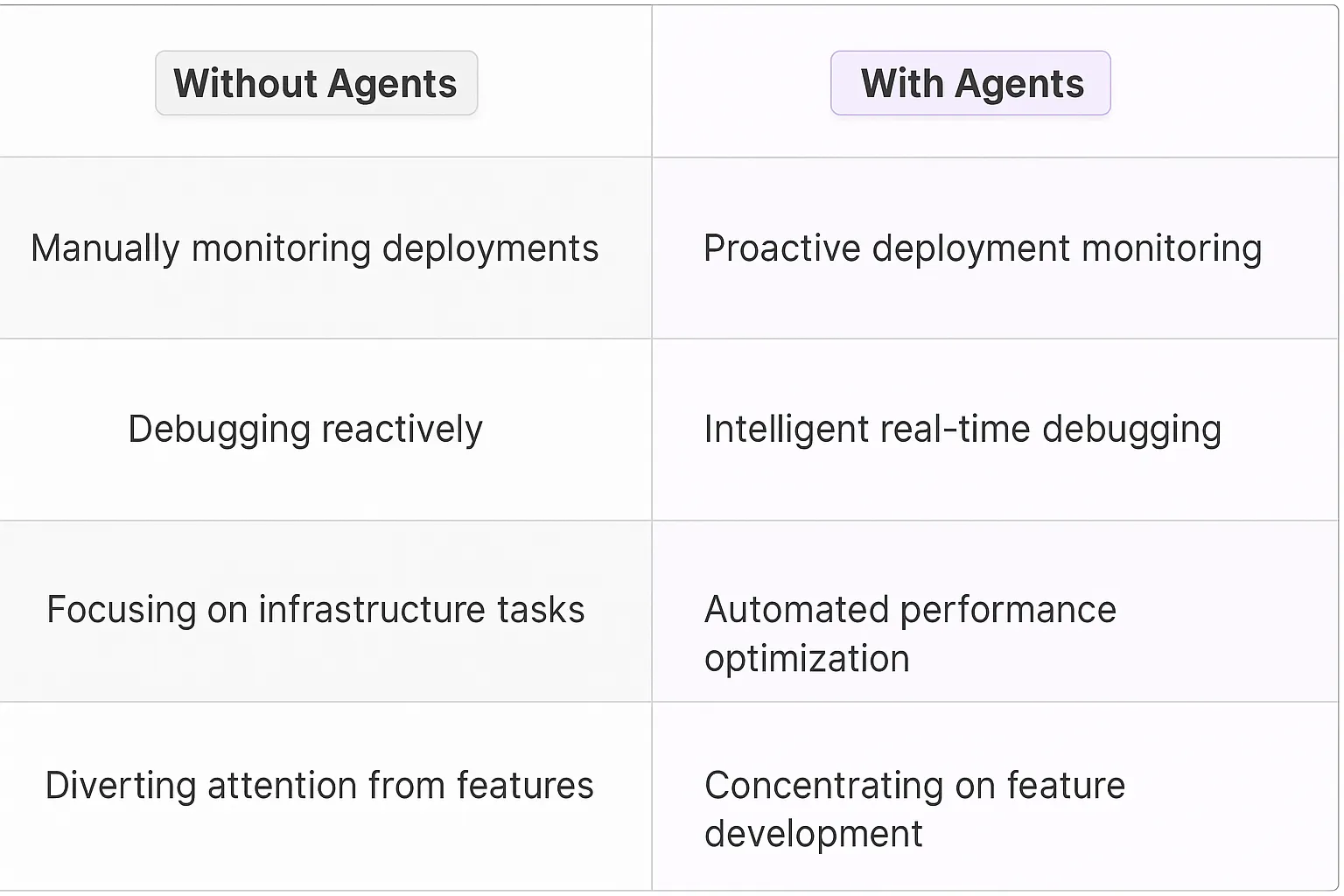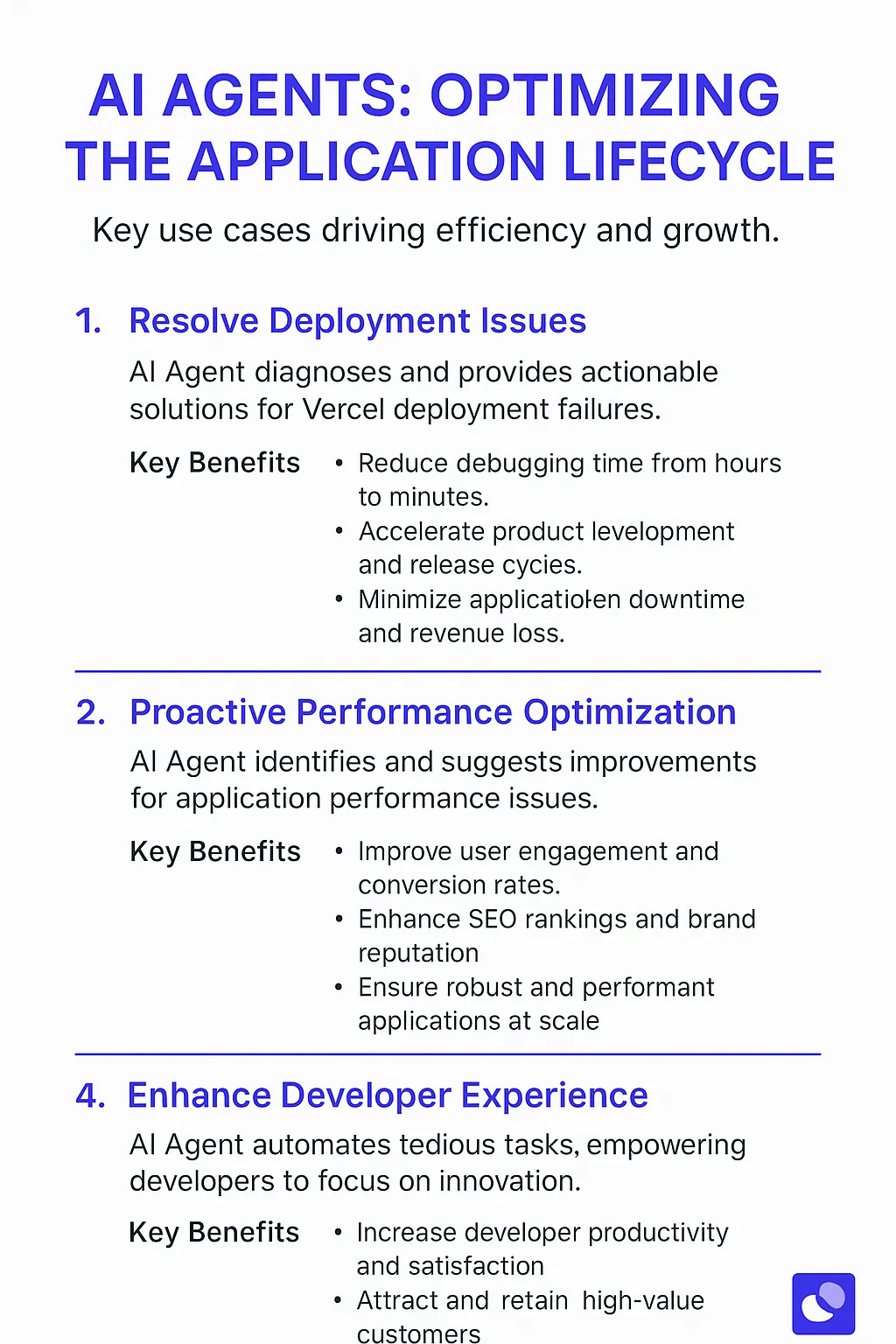Vercel
Understanding Vercel's Cloud Platform and Features
Vercel stands as a cloud platform for static sites and serverless functions, powering some of the web's most sophisticated applications. The platform specializes in providing a zero-configuration deployment environment, particularly optimized for frontend frameworks like Next.js. Through its global edge network, Vercel delivers blazing-fast content delivery and seamless developer experience.
The platform excels with instant deployments, automatic SSL, and serverless functions that scale automatically. Its preview deployments feature enables teams to visualize changes before they go live, while the Edge Network ensures optimal performance across global regions. The platform's Git integration enables automatic deployments with every push, creating a seamless development workflow.

Benefits of AI Agents for Vercel
What would have been used before AI Agents?
Before AI agents, developers working with Vercel relied on traditional debugging methods, manual log analysis, and direct CLI interactions. They spent countless hours combing through deployment logs, troubleshooting build failures, and manually optimizing performance issues. The process involved multiple browser tabs, constant context switching, and piecing together information from various documentation sources.
What are the benefits of AI Agents?
AI agents transform the Vercel development experience through intelligent automation and contextual understanding. They function as specialized digital teammates who deeply understand Vercel's infrastructure, deployment patterns, and common failure modes.
The most significant benefit comes from their ability to detect and diagnose deployment issues in real-time. When a build fails, the AI agent analyzes the error patterns, cross-references them with known issues, and provides specific, actionable solutions - often before developers even notice the problem.
Performance optimization becomes more sophisticated with AI agents monitoring deployment metrics. They identify bottlenecks in build times, suggest caching strategies, and recommend configuration changes based on project-specific patterns and requirements.
For teams working on complex Next.js applications, AI agents serve as specialized knowledge workers who understand the nuances of server-side rendering, edge functions, and image optimization. They provide targeted suggestions for improving build performance and reducing deployment times.
The network effects are particularly powerful - as more developers interact with these AI agents, they learn from each deployment scenario, building a rich knowledge base of solutions that benefit the entire Vercel ecosystem. This creates a compounding advantage where each solved problem makes the platform smarter for everyone.
The result is a dramatic reduction in debugging time, faster deployments, and more reliable applications. Developers can focus on building features rather than wrestling with infrastructure concerns, creating a multiplier effect on team productivity.

Potential Use Cases of AI Agents with Vercel
Development Workflow Processes
AI Agents integrated with Vercel transform how developers build and deploy web applications. The agents analyze deployment logs in real-time, identifying potential bottlenecks and suggesting optimizations for build times. When performance issues arise, these digital teammates investigate the root cause by examining serverless function execution patterns and Edge Network distribution.
During the development process, AI Agents monitor Git commits and automatically flag potential security vulnerabilities or performance anti-patterns before they reach production. They can analyze bundle sizes and suggest code splitting strategies specific to the project's architecture.
Deployment and Infrastructure Tasks
The real power of AI Agents in Vercel shines through automated infrastructure management. These agents monitor deployment health across regions, automatically adjusting Edge Network configurations for optimal performance. They analyze traffic patterns and suggest strategic placement of static assets to minimize latency.
When traffic spikes occur, AI Agents proactively scale resources and provide detailed analytics on user behavior patterns. They can identify which API routes experience the highest load and recommend caching strategies tailored to specific endpoints.
Code Quality and Testing
AI Agents serve as sophisticated code reviewing, examining pull requests for potential improvements in Next.js implementations. They analyze component rendering patterns and suggest optimizations for server-side versus client-side rendering decisions.
The agents can automatically generate and maintain end-to-end tests based on user interaction patterns, ensuring critical user paths remain functional across deployments. They monitor test coverage and suggest areas requiring additional testing based on usage analytics.
Performance Optimization
Through continuous analysis of Core Web Vitals, AI Agents identify specific components and pages that impact performance metrics. They provide targeted recommendations for image optimization, font loading strategies, and third-party script management.
The agents track performance regressions across deployments and automatically generate detailed reports highlighting the impact of code changes on key metrics like First Contentful Paint and Time to Interactive.
User Experience Enhancement
AI Agents analyze user session data to identify patterns in navigation flows and suggest improvements to site architecture. They monitor form submissions and user interactions to detect friction points in the user journey.
By processing error logs and user feedback, these digital teammates help prioritize bug fixes and feature improvements based on actual user impact and business value.

Industry Use Cases
AI agents within Vercel unlock powerful new capabilities across multiple sectors, fundamentally changing how teams build and deploy web applications. The real magic happens when these digital teammates handle complex deployment workflows, allowing developers and businesses to focus on their core strengths.
From e-commerce platforms needing instant deployments to enterprise teams managing multiple staging environments, Vercel's AI agents adapt to distinct industry requirements. They excel at identifying deployment bottlenecks, suggesting performance optimizations, and maintaining consistent development standards across large organizations.
The impact is particularly noticeable in high-stakes industries where deployment speed and reliability directly affect business outcomes. When integrated thoughtfully into existing workflows, these AI agents become invaluable team members who understand context, learn from patterns, and make increasingly sophisticated decisions over time.
Looking at specific industry applications reveals how these capabilities translate into tangible business value. Whether it's automated testing for financial services applications or intelligent preview deployments for media companies, the use cases demonstrate the depth and breadth of what's possible.
E-commerce Growth with Vercel AI Agents
Online retailers face intense competition to deliver personalized shopping experiences while maintaining operational efficiency. Vercel AI Agents transform how e-commerce teams handle product management, customer service, and technical operations.
A mid-sized fashion retailer with 50,000 monthly customers deployed Vercel AI Agents to analyze product performance data and automatically optimize their product listings. The AI Agent monitors inventory levels, sales velocity, and customer feedback to make real-time adjustments to product descriptions, pricing, and categorization.
When new products arrive, the AI Agent generates SEO-optimized product descriptions by analyzing similar successful listings and current market trends. It identifies key selling points and automatically creates variations for A/B testing, leading to a 23% increase in conversion rates.
The technical implementation connects the AI Agent directly to the product database and content management system. It processes incoming product data, applies machine learning models trained on historical sales patterns, and pushes updates through Vercel's deployment pipeline without human intervention.
Beyond the immediate efficiency gains, this approach creates a feedback loop where the AI Agent continuously learns from customer interactions and purchase behaviors. The system gets smarter over time, adapting product positioning based on seasonal trends, competitor movements, and changing customer preferences.
For e-commerce teams, this means shifting focus from routine content updates to strategic decisions about product lines and market expansion. The AI Agent handles the heavy lifting of day-to-day optimization, while humans direct overall strategy and creative direction.
Technology Companies Scale Support with Vercel AI Agents
Software companies operating at scale face unique challenges around developer support, documentation maintenance, and technical debt management. The integration of Vercel AI Agents into development workflows creates multiplicative effects on team productivity and code quality.
A rapidly growing SaaS platform with over 200 developers implemented Vercel AI Agents to transform their technical documentation and support processes. The AI Agent continuously scans GitHub repositories, pull requests, and internal wikis to maintain an up-to-date knowledge graph of the codebase.
When developers encounter issues, the AI Agent provides contextual assistance by analyzing the current code state, historical bug patterns, and relevant documentation. It automatically generates code examples, suggests optimization approaches, and links to related internal resources - reducing the average time to resolution by 47%.
The technical architecture leverages Vercel's edge functions to process queries in real-time. The AI Agent indexes code changes, API updates, and developer discussions, building a semantic understanding of the entire technical ecosystem. This allows it to spot patterns in technical debt accumulation and proactively suggest refactoring opportunities.
Most notably, the system excels at knowledge transfer between teams. When new developers join projects, the AI Agent creates personalized onboarding paths based on their background and the specific systems they'll work with. It identifies potential knowledge gaps and surfaces relevant learning resources automatically.
The compounding benefits become clear as the AI Agent learns from each interaction. Teams spend less time answering repetitive questions and more time on complex problem-solving. The documentation stays fresh without manual updates, and tribal knowledge gets captured systematically rather than remaining siloed.
This shift represents a fundamental evolution in how technical teams operate. The AI Agent serves as an institutional memory that grows more valuable over time, while developers focus on innovation and architectural decisions that truly require human creativity.
Considerations and Challenges
Implementing Vercel AI Agents requires careful planning and understanding of several key technical and operational factors. The complexity increases with scale, making it crucial to address these challenges early in the development process.
Technical Challenges
Rate limiting poses a significant constraint when deploying Vercel AI Agents. Teams need to implement robust queue management systems to handle concurrent requests effectively. Memory management becomes critical as AI models consume substantial resources, potentially impacting application performance.
API versioning and compatibility require constant attention. As Vercel updates their AI infrastructure, maintaining backward compatibility while leveraging new features demands careful orchestration. Teams must implement proper error handling and fallback mechanisms to ensure system reliability.
Operational Challenges
Cost management emerges as a primary concern. AI inference costs can escalate quickly with increased usage, necessitating implementation of usage quotas and monitoring systems. Organizations need clear policies on resource allocation and consumption limits.
Training and documentation requirements often exceed initial estimates. Development teams need specialized knowledge in both AI operations and Vercel's infrastructure. Creating comprehensive documentation for maintaining and troubleshooting AI agents becomes essential for long-term success.
Integration Considerations
Security and data privacy demand rigorous attention. Teams must implement proper authentication mechanisms and ensure compliance with data protection regulations. The integration process requires careful consideration of data flow between existing systems and AI agents.
Performance monitoring and observability tools become crucial for maintaining service quality. Teams need to establish clear metrics for latency, accuracy, and reliability. Setting up proper logging and monitoring systems helps identify and resolve issues before they impact users.
AI-Powered Evolution in Web Development
The integration of AI Agents with Vercel marks a significant evolution in web development practices. These digital teammates are reshaping how teams approach deployment, debugging, and optimization tasks. The network effects created by their continuous learning drive exponential improvements across the platform. As adoption grows, the combination of human creativity and AI capabilities will unlock new possibilities in web development, making complex tasks more manageable and enabling teams to focus on innovation rather than infrastructure management.













